INDIEPIX acquires DVD and VOD US rights for A Blast
Indiepix acquired the DVD and VOD US rights for A BLAST.
Release dates for both formats to be announced soon.

Indiepix acquired the DVD and VOD US rights for A BLAST.
Release dates for both formats to be announced soon.

«Ich verdichte die realen Geschichten der Menschen»
Er würde nie einen Dokumentarfilm über die Krise drehen, sagt der griechische Filmregisseur Syllas Tzoumerkas, er wolle keine Armutspornographie machen. Also dreht der junge Regisseur Spielfilme, Familiengeschichten. Sie erzählen aus der Krise, von der Krise, aber sie sind Fiktion.
Wie auch die Filme von Athina Rachel Tsangari. Auch sie gehört zur «neuen griechischen Welle». Sie wolle mit ihren Filmen nicht von der griechische Krise erzählen, sagt sie. Und dennoch sei sie eine durch und durch griechische Filmemacherin. Ein Beitrag über die griechische Krise als Narrativ des griechischen Kinos.

Κυκλοφόρησε στα βιντεοκλαμπ η ελληνική dvd έκδοση της ΕΚΡΗΞΗΣ (A BLAST) από την Tanweer. Eλληνικοί και αγγλικοί υπότιτλοι, φωτογραφίες από τα γυρίσματα και βίντεο από τις πρόβες, κριτικές, φεστιβάλ, κ.α.
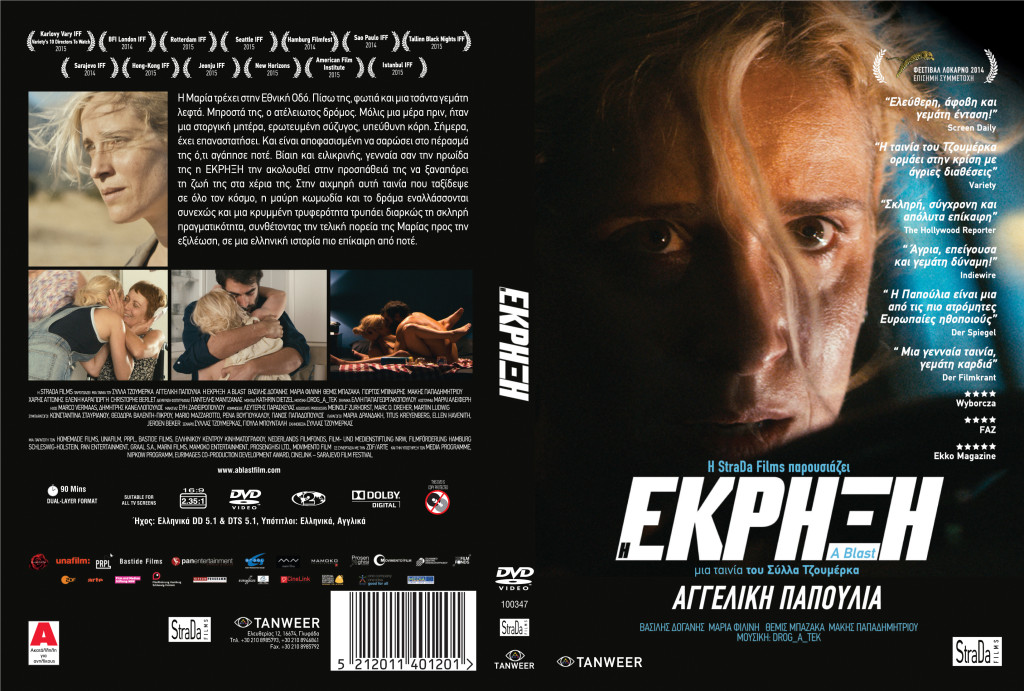
A Blast in Cypriot cinemas November 20th – Η ΕΚΡΗΞΗ στους κυπριακούς κινηματογράφους από 20 Νοεμβρίου
Λευκωσία / Nicosia (Κ Cineplex & Κ Cineplex @ the Mall of Cyprus), Λεμεσός / Limassol (K CIneplex & Rio Limassol), Λάρνακα / Larnaca (K Cineplex), Πάφος / Paphos (Κ Cineplex @ the Kinghs Avenue Mall)
American Film Institute (AFI) selects Syllas Tzoumerkas’ A BLAST for this year’s European Film Showcase at the AFI Silver Theatre and Cultural Center in Silver Spring in Washington! Screenings: Sat, Dec. 12, 9:40 p.m.; Sun, Dec. 13, 7:15 p.m

Maria Filini unanimously wins the Best Debut by an Actress Award at the Athens IFF for her performance as ‘Gogo’ in A BLAST!
Maria Filini thanked the jury and the festival, Syllas Tzoumerkas for the trust and the friendship, Youla Boudali & Syllas Tzoumerkas for writing such a monster like Gogo and Maria Drandaki for making it all happen. She dedicated the award to her sister.
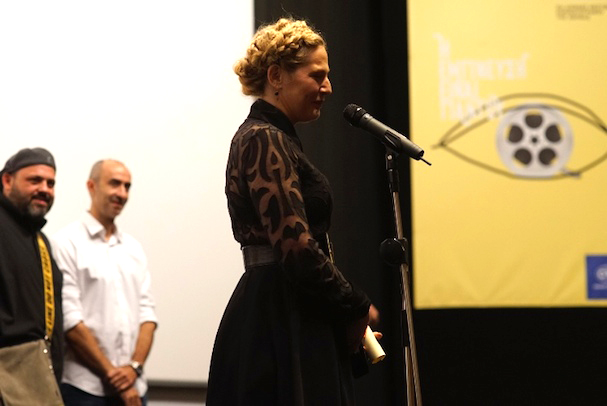
Gogo
Maria Filini was born in Nafplio, Greece. She studied acting at the Archi Drama School of Athens. Since 2003, she performed in various stage performances in several venues in Athens, directed by directors Y.Dalianis (Norway, today), Th.Moschopoulos (The Boy With the Suitcase), V.Georgiadou (The Certificate), Th.Glinatsis (Frankenstein), I.Dimadis (Four Little Girls). She performed as an actress in a series of performances by the Blitz Theater Group in several venues in Athens and across Europe (New Order, The House, Katerini, Cinemascope, Late Night), and Vassilis Mevrogeorgiou (A Night in February, Nothing but the Truth co-director, Lions, A Massive Explosion, The Two Gentlemen of Verona). Together with fellow actors Katerina Mavrogiorgi, Vassilis Mavrogeorgiou, Serafim Rodis and Nikos Maramathas she co-funded the Skrow Theater Group and the Skrow Theater venue in Athens. She currently performs and/or co-directs in the Skrow theater’s performances (Up to Now, Absolute Machine, Stories of Self-Sacrifice, etc.). A Blast is her first appearance in a feature film. For her performance in A Blast, she was awarded with the Best Debut by an Actress Award at the Athens International Film Festival. Her upcoming film credits include Yorgos Zois’ Interruption (2015) and Elina Psykou’s Iwo and Sofia (in production).
Filmography
Italy: Syllas Tzoumerkas’ A BLAST wins the Critics’ Prize at the Otranto FFF! for “its capacity to narrate through its fragmented and sensitive expressivity the desperate and vengeful desire of a woman who, as a modern Medea, looks for her self-affirmation in the frame of contemporary Greece.”
A Blast in Danish cinemas from Øst for Paradis! Read the first reviews, screenings, etc. @ ekko, cinemazone →.
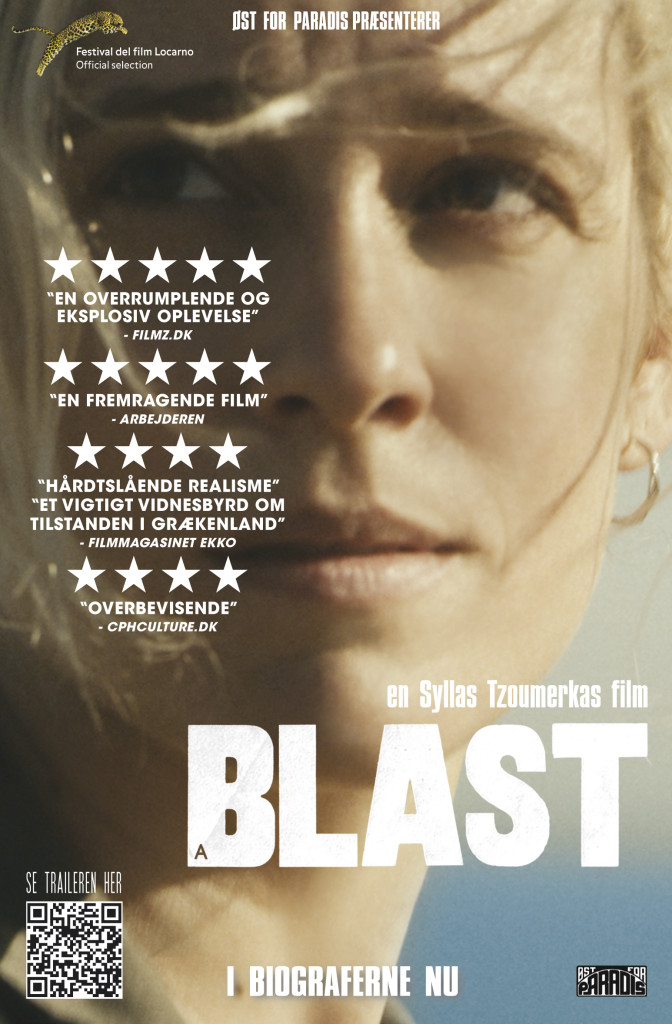
Syllas Tzoumerkas’ second film is literally having A Blast in its trajectory in the international festival circuit: Since March 2015, when it opened in a number of theaters in the Netherlands, the film found distribution in Germany, Switzerland, Italy, Poland, and on September 19, 2015 it premiered in Denmark – opening the way for the raving journey of the main character, Maria (Angeliki Papoulia), beyond the borders of the country, beyond the stereotypes in the representation of a young, Greek, female subject ‘in crisis’. The director discussed his method, his references and profound thoughts on filmmaking with Andrzej Marzec, running the distance between the metaphorical and the literal, between individual and collective truths and illusions.
Andrzej Marzec: In my opinion, it is your movie Hora Proelefsis/Homeland (2010), together with Yorgos Lanthimos’ Kynodontas/Dogtooth (2009) that gave rise to a dynamic shift in the history of Greek cinema, and evoked interest in family as a filmic subject. While Lanthimos paints a hermetic, abstract, enigmatic image of an ordinary breadwinner (composing a bizzare parable of family), you create some sort of socially engaged cinema – from the very beginning you are interested in the turbulent changes in the social fabric and civil disobedience. Why did you decide to embark on this cinematographic path?
Syllas Tzoumerkas: Homeland is a film born by rage; rage against both family and country. This is the film’s driving force, in terms of theme and core sentiment. The turbulences you mention in the social fabric, as well as the civil and personal disobedience, are major fields of investigation in the film – I mean the nature of these notions, the ideas that fuel them, the specific actions by which they are expressed. In terms of style (in other words, the way in which the film creates a body of meaning) it’s not a film that works with abstraction, but one that works through accumulation. What I wanted to do in it was to shed light on the behavioral patterns of patronizing and the secretive lies that led to the pitiless generation fights inside the lower-middle-class families – and consequently in the country’s modern political history. A key point for me in the way the film’s narration is built, is the following: I don’t like placing the core parable in a test tube, but I prefer to set it in what we call the very ‘reality’ of things, to the extent of using family photos or TV footage, or throwing the actors into real public events as they occur. To me, there lies hidden an important level of understanding: how are these patterns, or the parable, visually born, how do they fit in, and how do the twist and alter our idea of the reality of historical events. It’s like creating a kaleidoscope, where the existential situations, the psychology, story and history co-exist simultaneously, either in harmony or engaging in endless clashes and contrasts. Overall, Homeland is my version or – to be more accurate in what concerns my intentions – my kick on the corpse of the film (and literature) genre we call ‘family saga in a tormented era.’
AM: You were the first among the contemporary Greek directors to relate in such a determined, bold manner the conflicts within the family with the crisis in society itself. Where does this “family equals society” correlation come from? Is it perhaps an exclusively Greek phenomenon? Can we imagine the society in categories other than blood relationships or kinship?
ST: Growing up in the 80s and 90s in Greece, you could see the strength of the blood relations, the way large families were affiliated to political parties, how a certain lower-middle-class mentality of dreaming of becoming a nouveau-riche ruled the country;[evident] both in individuals, but also the major political groups. This is the audience these parties were addressing to, flattering all their weaknesses and prejudices, and at the same time, always keeping them in their mothering and suffocating embrace. So, this was, and still is, the field of the social crisis, this unbreakable family-society tie. The idea is not new: you can find it all around in theatre and literature, from the ancient Greek tragedies to Dostoyevski’s The Devils and Chekhov. Personally, I despise this notion of blood and the special kind of de facto connection it implies, this ‘we have the same blood, we have the same disease’ kind of connection. And the main reason I despise it and it even scares me, is that it immediately turns grown-up men and women into scared little boys and girls, with all the dreadful psychological characteristics of this dependent age. So, I pictured Homeland like a story drawn from the poem “Mauvais Sang” (Une Saison en Enfer) As Rimbaud says in the poem of the same title and also as a reference to the Blast’s first scene: “Not a family in Europe I don’t know. I mean families like mine, who owe it all to the declaration of the Rights of Man. – I’ve known every good son of good family!”

Jako pierwszy z greckich reżyserów w zdecydowany sposób wiążesz ze sobą kryzys społeczny i konflikty w obrębie rodziny. Skąd bierze się utożsamienie rodzina=społeczeństwo, czy jest to specyficznie greckie myślenie? Czy można myśleć o społeczeństwie w innych kategoriach niż pokrewieństwo, więzy krwi?
Jeśli dorastało się w Grecji lat 80. i 90., to widziało się siłę więzi rodzinnych, na przykład wówczas, gdy duże rodziny wstępowały do partii politycznych. Jednocześnie niższa klasa średnia o pewnej mentalności, aspirująca do awansu społecznego, kierowała naszym krajem – zarówno jednostkami, jak i czołowymi grupami politycznymi. Rodzina to publika, do której zwracają się partie, schlebiając ich słabościom i uprzedzeniom, a jednocześnie zawsze trzymając ich w duszącym, matkującym uścisku. Nienaruszalna więź rodzinno-społeczna stanowiła i stanowi nadal obszar kryzysu społecznego. To nie jest nowy temat: można go odnaleźć w każdym teatrze i literaturze, od starożytnych greckich tragedii do „Biesów” Dostojewskiego czy Czechowa. Osobiście pogardzam „krwią” i specyficznym rodzajem związku, jaki ona narzuca – tego uwikłania „mamy jedną krew, mamy jedną chorobę”. A głównym powodem, dla którego gardzę nią, co mnie nawet przeraża, jest to, że natychmiast zmienia dorosłych mężczyzn i kobiety w wystraszonych chłopców i dziewczynki ze wszystkimi przerażającymi symptomami psychologicznymi tej epoki uległości.

Angeliki Papoulia – Aktorskie odkrycie Grecji
Ma czterdzieści lat, ale równie dobrze może zagrać kobietę starą i nastolatkę – dlatego w “Płomieniu” łatwo przechodzi z młodszej do starszej wersji swojej bohaterki.
Jeszcze kilka miesięcy w sieci pełno było memów naśmiewających się z Grecji oczekującej finansowego wsparcia od Europy. Kto śmiał się z Greków, powinien zobaczyć grecki “Płomień” – film o ludziach, którzy żyją w świecie ciągłego kryzysu.
Kto nie wierzy, że ograniczenia mogą wyjść filmom na dobre, powinien spojrzeć na Grecję – nie było w ostatnich latach kinematografii, która tak mocno odświeżyłaby rynek światowych festiwali. A jednocześnie nie było kraju bardziej dotkniętego kryzysem gospodarczym niż Grecja.
Nowa fala grecka i jej najważniejsze tytuły – “Kieł” i “Alpy” Lanthimosa, “Attenberg” Tsangari, “W domu” Karanikolasa, “Chłopiec jedzący ziarno” Lygizosa – to tylko niektóre przykłady filmów, które zrywają z tradycyjną fabułą, bezceremonialnie obnażają fałsz i terror rodzinnych układów, pokazują emocjonalne i moralne zagubienie, finansowe kataklizmy, a czasem: zwykły głód. Do tych filmów należy też “Ojczyzna” Syllasa Tzoumerkasa, który poprzez epizodyczną narrację i kamuflowane retrospekcje wrzuca widza w sam środek skonfliktowanej, walczącej o władzę (i pieniądze) rodziny. Oraz jej wstydliwych tajemnic z przeszłości.

“Punchy, Difficult, Allegorically Urgent Greek Tragedy: In A Blast, a narrative of personal liberation becomes a political allegory of powerful pessimism. Maria, like her country, may escape the shackles of unfair debt and struggle and poverty, but she can only do it by outrunning her pursuers, leaving a destabilized family behind and eventually facing the future in a state of staggering aloneness. (…) Tzoumerkas refuses to portray Maria as anything so uncomplicated as a victim. Maria is explicitly a woman – wife, daughter, mother, sister – and some of the scenes of most urgent, shocking power come from quieter moments when she simply, clearly negates or repudiates one of those prescribed roles. She quietly tells her counseling group that she never wants to see her children again, she coolly sits across a dinner table from her father, now a widower, and explains in the cruelest terms how unnecessary and revolting he is to her: parricide over a bowl of soup. In fact Maria’s journey can be read as a series of assassinations, of everything and everyone she has ever known.” Read more →
A Blast, Syllas Tzoumerkas’s second film, is the frantic, unsettling and intriguing record of a woman’s journey, a journey more emotional than literal. The watching viewer is strapped in beside her, along for the ride, hair blown back. (…) ‘I ‘ve lived a ridiculous life’: an insight of a woman on the edge of a nervous breakdown, forced by crisis into a full-scale reappraisal of things. This is the pain at the heart of Angeliki Papoulia’s dangerously committed, exposed performance, and it’s the brave exposure of this pain which, against the odds, permits the viewer to sympathize with a woman who has chosen to abandon her children. Though her character is not having a blast, it looks exactly as though Papoulia is. (…) It is all shot by D.P. Pantelis Mantzanas with captivating energy and brio, cutting furiously back between past and present via Kathrin Dietzel’s via sharp, seamless editing, as it renders Maria’s furious, unfocused energy and mood swings, and becoming blindingly high-speed over the final fifteen minutes. (…) A black, bleak, urgently contemporary film, as a whole, A Blast is just that: Syllas Tzoumerkas’ charged personal diatribe against an economic system seemingly designed first to make people, and then to break them. Read more →
**** Another example of new Greek cinema, a film experimenting with form, immersed in the crisis of everyday Greece and Europe, but also painfully universal. (…) Angeliki Papoulia is a volcano of emotions (…) What is most interesting in Syllas Tzoumerkas’ work is also what is most universal: the rejection of illusion. We do not really know what to do next, still, regardless the price, it’s worth opening our eyes!
W pierwszej scenie filmu słyszymy informację o ogniu, który jeden z mieszkańców celowo zaprószył w lesie. W kolejnej dwie siostry – ta najważniejsza w filmie, czyli Maria (świetna, będąca tym razem wulkanem emocji Papoulia) oraz Gogo (Filini) – powtarzają przed egzaminem Powszechną Deklarację Praw Człowieka. “Wszyscy ludzie są równi”, “każdy ma prawo do szczęścia” – mówią półżartem, półserio. Ale zabawa zmienia się w swoistą potyczkę, oprócz słownych złośliwości zaczyna się też szarpanie. Czy to jest właśnie ten “zły” płomień, który może zmienić się w pożar i doprowadzić do tragicznych spustoszeń?
Maria jest mężatką, ma trójkę dzieci, traktowaną przez siebie z góry siostrę, niemal ciągle milczącego ojca oraz chorą matkę na wózku. Ale być w tej rodzinie znaczy: ciągle się boksować, kłócić. I zgodzić się na samotność – mąż Marii Yannis (Doganis) jest marynarzem, więc w domu bywa gościem. Od “chcę” bohaterka gładko przechodzi do “muszę”. Właściwie nigdy nie widzimy Marii autentycznie radosnej. Nawet łóżko, gdzie odreagowuje całą swoją niespełnioną zachłanność na życie, daje spełnienie iluzoryczne. Read more →
***** A uniquely intelligent, unprecedented portrait that reveals the moods, secrets and deep divisions that run in the Greek society in the times of crisis. There has never been such a powerful film about it before.
Mało kto rozumie Greków. Ich podejście do państwa, demokracji, płacenia podatków jest zgoła inne niż pozostałych Europejczyków. Anarchia myli im się czasem z wolnością, godność z faszyzmem. Obrazowo wygląda to tak, że różnica mentalności Greka i Holendra jest nawet większa niż różnica mentalności Holendra i Rosjanina. Kto nie wierzy, a chciałby się upewnić, na czym to polega, powinien docenić „Płomień” – niezwykły dramat obyczajowy Syllasa Tzoumerkasa o kłamstwach, złudzeniach i gniewie, które doprowadziły ten kraj do gospodarczej i moralnej zapaści. Niespełna 30-letnia bohaterka filmu, fenomenalnie zagrana przez Angeliki Papoulię („Kieł”, „Alpy”), uświadamia sobie, że wiedzie absurdalne życie i nie ma pojęcia, jak je zmienić.Read more →
Maria to kobieta o charakterze rozpiętym między dwoma siłami. Z jednej strony, potrafi zniszczyć wszystko, co stoi na jej drodze – siłą torować sobie w życiu drogę ku zmianie. Z drugiej strony, jej destrukcyjna moc stopniowo oczyszcza nagromadzone latami napięcie. Z zewnątrz Maria zachowuje się jednak jak wariatka. Zdarza jej się rzucać rzeczami, porzucać rodzinę, krzyczeć bez opamiętania, wikłać w spontaniczny romans i zupełnie nie zwracać uwagi na to, jak reaguje na nią zarówno społeczeństwo, jak i najbliższa rodzina. Jej wybuch ma tak ogromną siłę rażenia, jakby dojrzewał w niej latami, podżegany przez wiele czynników, od monotonii życia w rodzinie, po kryzys ekonomicznym zaciskający się na szyi klasy średniej coraz mocniejszym uściskiem. „Kiedy pracowaliśmy na scenariuszem, w kraju dało się zaobserwować nasilające się radykalne zachowania w społeczeństwie. One pojawiały się wszędzie: w życiu prywatnym, politycznym i zawodowym. Nie sposób było nie dostrzec, że są one śmiałe i wyzwalające, ale też złowrogie i niebezpieczne – w kraju pojawiły się np. grupy odwołujące się do praktyk faszystowskich” – mówi Syllas Tzoumerkas. Read more →
A BLAST in Polish cinemas, 11/09/2015, from Against Gravity!
“A uniquely intelligent, unprecedented portrait that reveals the moods, secrets and deep divisions that run in the Greek society in the times of crisis. There has never been such a powerful film about it before.” Polityka
“The heroine is a dynamite! Maria in A Blast is full of passion, anger and despair.” Gazeta
“The loneliness of the heroine and her rebellion against her family in a way is the abandoned portrait of the Greeks rebellion against those who guard their safety. Syllas Tzoumerkas proves himself to be so much more than a mere journalist with a short term of validity. I recommend!” Czytnikkultury blog

A BLAST in Roma, Milano, Torino, Napoli, Modena, Fermo, Palermo. For theaters & screening times, check here →.

Bonsai Films acquired the rights for A BLAST’s theatrical release in Australia.
“Die Welt der Eltern wird kollabieren”
SZ: Herr Tzoumerkas, Sie haben mit “A Blast – Ausbruch” einen Film über den Zorn der Kinder gemacht, die ihre Eltern für die Krise verantwortlich machen. Haben Sie auch so eine Wut?
Syllas Tzoumerkas: Klar, ich bin auch wütend! Aber genauso wie in meinem Film die Beziehung zwischen Kindern und ihren Eltern weit komplexer ist, so ist sie es auch in der Realität. Sicher sind da die Schuldzuweisungen einer jungen Generation, die geradewegs in den Abgrund stürzte. Aber die Beziehungen zwischen Eltern und Kindern sind vielschichtig und voller Widersprüche: Liebe, Schutz, Glückseligkeit, Opfer, Ansprüche, Egoismus, Wut – alles ist dabei. Darum vergeben die einen oder lassen zumindest den Dingen ihren Lauf. Die anderen sind verbittert und wollen ihre Eltern strafen.
Syllas Tzoumerkas and Angeliki Papoulia talk to NDR (tv) and 12 Uhr Mittags (Radioeins) for the German release of A BLAST (AUSBRUCH).
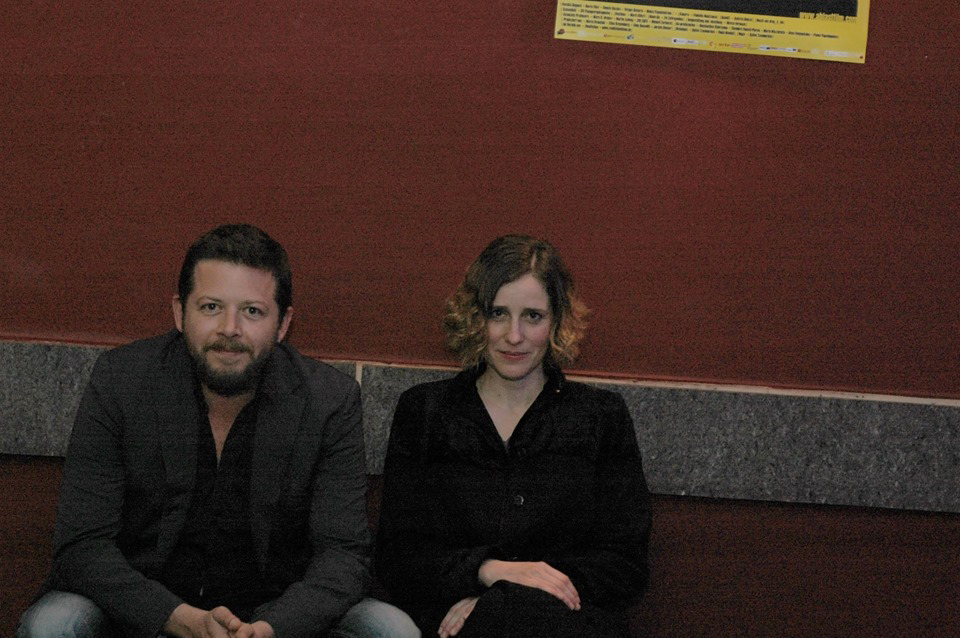
Watch the NDR tv-interview →
Listen to 12 Uhr Mittags radio interview →
Syllas Tzoumerkas and A Blast were selected for the ‘Critics’ Choice: Variety‘s 10 directors to watch 2015’ program of the 50th Karlovy Vary IFF. Syllas Tzoumerkas will attend the festival to present film, 4 years after the presentation of Homeland (2010) in the first tribute to the Greek New Wave held by the Karlovy Vary festival.

Graphic designer Min Kyungmoon designed the Korean poster for A Blast for the Jeonju International Film Festival’s exhibition 100 films, 100 posters.

Syllas Tzoumerkas aims at the guts of the audience. A Blast is an insanely intensive editing beast. Past and present are in a permanent state of confrontation. Almost without noticing the edit, scenes and emotions that are separated by many years, collide. The result are montage sequences that stay in the mind for long. In fact Tzoumerkas directs each sequence towards its boiling point. Emotions and nerves are on the edge.
A Blast is a toxic reckoning with the parent generation, a radical attack on the generation whose actions led to the current crisis. But here nobody gets off scott-free. Not even Tzoumerkas’ own generation, which stumbles through life in blind egomania and overwhelming perplexity, leaving scorched earth wherever they get to.
Angeliki Papoulia, one of the most fearless European actresses, plays Maria without an emergency break, yet leaving enough space to hint at the desperation of her character.
A Blast shows a dimension of the Greek misery, which in German media is only mentioned in fleeting. The film shows a country with a crack right in the middle. A crack that runs through generations, families, the society. Self hatred rules. The economic and humanitarian crisis is a psychological one too.” Read more →
Syllas Tzoumerkas talks about the state of a generation without allegorical detours. He goes straight to the Greek state of things, using the anger, the frustration, the restlessness, the pain and the passion of the protagonist Maria with breathtaking speed. Read more →
Syllas Tzoumerkas and Angeliki Papoulia talk to NDR (tv) and 12 Uhr Mittags (Radioeins) for the German release of A BLAST (AUSBRUCH). NDR tv-interview and 12 Uhr Mittags (Knut Elstermann, Radioeins


With its passionate, impetuous and revolting hero A Blast is the Greek crisis. (…) Maria is a fighter, her busy tirelessness reminds of the the women in films by Alexander Kluge of the sixties. (…) There is only a short moment of freedom when Maria and her sister are at the sea. They are carefree like two girls, they are silly, talk about the human rights, which are granted to everybody. They play with the terms, throw them up in the air, these demanding terms, that are not covered by reality anymore. They are just as boisterous as the two Maries in Věra Chytilovás „Sedmikrásky“ from 1966 – just before the Prague Spring. Read more →
German preview premieres in attendance of Syllas Tzoumerkas & Angeliki Papoulia
Premiere mit Regisseur und Hauptdarstellerin:
Cologne,, Off Broadway, 9.4., 20.00 Uhr
Bonn, Brotfabrik, 10.4. 21.00 Uhr
Munster, Cinema, 11.4, 18.30 Uhr
Berlin, Hackesche H”fe Filmtheater, 12.4, 20.00 Uhr
Hamburg, 3001 Kino, 13.4, 19.00 Uhr
Ab 16.4:
Berlin, Bochum, Bonn, Dortmund, Dresden, Essen
Frankfurt, Freiburg, Hamburg, Hannover
Kiel, Cologne, Leipzig, Lubeck, Munchen, Munster
Nurnberg, Potsdam, Saabrucken, Seefeld, Stuttgart
Ab 30.4:
Halle, Mainz
Ab 7.5
Karlsruhe, Oldenburg

Ab 16. April im Kino: A BLAST – AUSBRUCH
Ein Film von Syllas Tzoumerkas
Bis gestern noch versuchte Maria (Angeliki Papoulia) eine gute Mutter, eine liebevolle Ehefrau und eine verantwortungsbewusste Tochter zu sein. Doch jetzt bricht sie aus. Heute Abend, wenn die Sonne untergegangen ist, wird alles, was ihr jemals wichtig war, in Scherben liegen.
A BLAST in German cinemas from Real Fiction, April 16th 2015
Syllas Tzoumerkas neemt in zijn energieke tweede film nadrukkelijk afstand van de omfloerste maatschappijkritiek van de Griekse ‘weird wave’: A Blast is een boze film met het hart op de tong. / Syllas Tzoumerkas takes in his energetic second film emphatic distance from the ‘Greek Weird Wave’. A Blast is an angry film that speaks its heart. Read more →
A BLAST in dutch cinemas, March 12 2015
Read more @ PRPL
Filmfreak facebook →
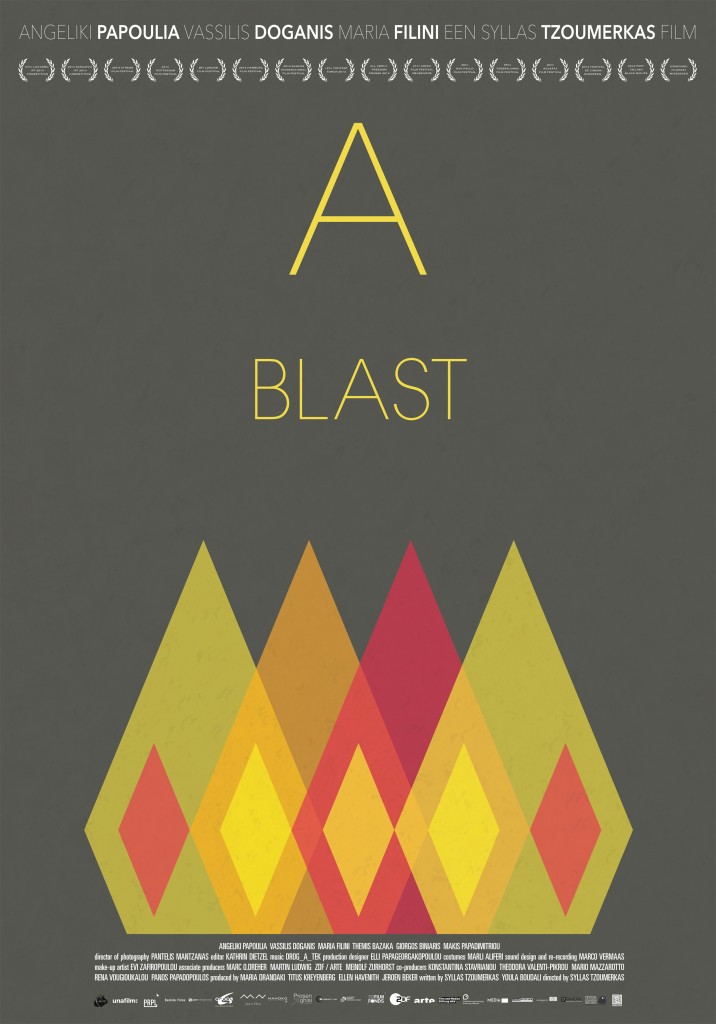
Sunday 08.02.15, 14:30 @ CinemaxX 14 (Potsdamer Straße 5, 10785 Berlin)
Original version with english subtitles. More info and contacts @ homemadefilms.gr
A Blast will have its Dutch premiere in a few days at the Limelight section of the Rotterdam International Film Festival 2015 and Filmfreak has just released the poster for its theatrical release.

‘The Miracle of the Sargasso Sea’, the new film project to be directed by Syllas Tzoumerkas, written by Youla Boudali & Syllas Tzoumerkas and produced by Maria Drandaki & Ellen Havenith, was selected to participate at the Rotterdam IFF Cinemart 2015 and the Berlinale Co-production Market 2015.
The story involves two women – a murder suspect and a law enforcer – who discover a striking similarity between them: in a senseless, bland world, neither wants to abide by the law.
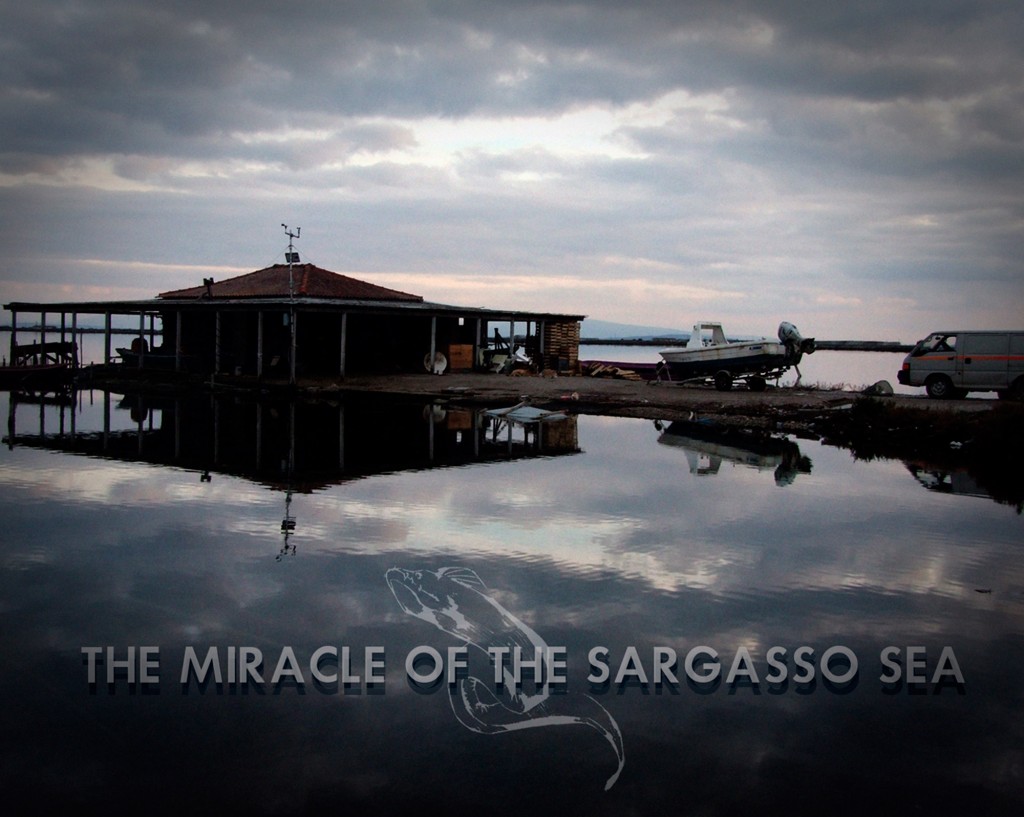
Syllas Tzoumerkas’ video interview for Euronews.
Set against the backdrop of Greece’s financial crisis, ‘A Blast’ tells the story of Maria who one day decides to leave behind her life, which no longer makes any sense to her. From carefree days on the beach and her passionate love affair with her future husband Yannis, the film shows her descent into nervous breakdown faced with single motherhood and financial ruin. “It’s the story of a woman who decides to change her life radically. She fights against all the people she loves, her family, and even herself. Why? Because she wakes up one day, during the Greek financial crisis, and no longer recognizes herself. She doesn’t know who she is anymore. She needs to find a way to gain back her self-esteem,” says director Syllas Tzoumerkas.
Premiered in Locarno in August, the film has been touring the film festival circuit to critical acclaim. Thirty-six-year old Syllas Tzoumerkas belongs to a new generation of Greek filmmakers whose movies deal more or less directly with their country’s economic and political crisis. “The film is not based on a true story about a particular person. But it stems from the experiences of a whole generation, a generation deeply affected by the financial crisis our country has been going through in recent years,” he says.
Angeliki Papoulia stars as Maria, who gradually faces the grim realisation that the small shop she runs for her wheelchair-bound mother is in deep financial troubles. With three young children to look after, her anger against her parents, her absent husband and the country’s economic situation explodes in an impressive crescendo.
Ο Σύλλας Τζουμέρκας, η Αγγελική Παπούλια και ο Βασίλης Δογάνης μιλάνε στο Flix.gr και τη Λήδα Γαλανού για την Έκρηξη. Read more →
Some seven weeks prior to the start of the festival, IFFR gives a glimpse of what to expect by revealing its first list of titles.
For its upcoming 44th edition, the festival will also be bringing films to Rotterdam that have been big art-house successes during the past year at other international film festivals. The programme will include works by renowned filmmakers such as Abderrahmane Sissako (Timbuktu), Ruben Östlund (Turist) and Christian Petzold (Phoenix). Home-grown talent will also be represented, with films by makers including Peter Hoogendoorn (Tussen 10 en 12). The 44th IFFR will take place from Wednesday 21 January through Sunday 1 February 2015.
These titles will be brought together under the label Limelight – new work by attractive names from contemporary cinema. All the films in Limelight will be screened in Dutch cinemas after their premieres at IFFR 2015. With Limelight, IFFR wishes to intensify its cooperation with Dutch distributors and support the release of quality, artistic films.
The likes of Myroslav Slaboshpytskiy (The Tribe), Rolf de Heer (Charlie’s Country), Alice Rohrwacher (Le meraviglie), Martín Rejtman (Dos disparos), Sharon Maymon & Tal Granit (The Farewell Party) and Syllas Tzoumerkas (A Blast) will attend the festival to give a personal presentation of their films.
Διαβάστε για την ΕΚΡΗΞΗ – 27 Νοεμβρίου στους κινηματογράφους. Συνεντεύξεις: Σύλλας Τζουμέρκας – Το Βήμα της Κυριακής – Η έκρηξη είναι και γιορτή (Γιάννης Ζουμπουλάκης), Η Καθημερινή της Κυριακής – “Σημασία έχει να μην είσαι δυστυχισμένος”(Δημήτρης Μπούρας), Εφημερίδα των Συντακτών Ζωή δεν αλλάζουμε χωρίς ν’ ανοίξει μύτη (Βένα Γεωργακοπούλου). Αγγελική Παπούλια – Lifo.gr Οι Αθηναίοι (Μ. Hulot), ΒΗΜΑdonna (Μαριαλένα Αστραπέλλου), Αθηνόραμα (Γιάγκος Αντίοχος) Βασίλης Δογάνης – ΒΗΜΑmen Ο Βασίλης Δογάνης μιλάει για την τέχνη του(Μαριαλένα Αστραπέλλου), Θέμις Μπαζάκα – Τα Νέα Η πρωταγωνίστρια του νέου ελληνικού σινεμά (Άκης Καπράνος), Σύλλας Τζουμέρκας – Έθνος Η κρίση οδήγησε τους μικροαστούς στα άκρα (Άντα Δαλιάκα), Monopoli.gr, Μια σαρωτική έκρηξη στους κινηματογράφους (Γιώργος Μητρόπουλος), Hit & Run (Γιάννης Κοντός), VICE (κείμενο, φωτογραφίες: Νατάσα Κούμη).
Papoulia particularly stands out in a terrific performance. In a lean run time her Maria believably turns from someone who is ready to take on the world with a love for all those around her into a bitter, angry at everyone for their role in her situation.
Syllas Tzoumerkas film is an intense work that will leave you bewildered, perhaps angry yourself at the world, powerful work. Read more →
I think the film is distinctive in a number of ways. Maria is certainly a compelling character. Here is an intelligent attractive woman who has a passionate relationship with her husband and for whom separation is difficult. (…) Apart from Maria as a character, the film is also distinctive in its layering of the complexity of the consequences of the economic crash. Businesses go under, families break up, criminal activity expands, government agencies can’t cope, ecological damage and destruction increases – the plot includes elements of all of these and presents them in a broken narrative in which the incoherence eventually leads to the final chase. Maria is determined to throw away whatever she has as a scream of anguish about the state of her life and the situation she finds herself in. The visual style of the film matches the urgency of the narrative with hand-held camerawork, swift tracking shots and a suitably raucous soundtrack. Read more →
Syllas Tzoumerkas’ striking soph feature tackles Greece’s ongoing financial crisis with aggressive gusto. This story of a young mother’s manic nervous breakdown in the face of financial ruin displays more than enough rough-and-tumble directorial nerve, coupled with bristling socioeconomic critique, to magnetize those accustomed to the headier demands of Greek New Wave cinema. (…) Papoulia negotiates the character’s colliding moods and impulses with frazzled gusto in a bravura performance that nonetheless never succumbs to mannered hysteria. She’s supported by spiky ensemble work, with Doganis and Filini both making intrepid screen debuts. Read more →
Νύχτες Πρεμιέρας 2014: Το «A Blast» του Σύλλα Τζουμέρκα είναι ένα αναμμένο φυτίλι. Το τοπίο που περιγράφει το «A Blast» είναι απλά τρομακτικό. Κυρίως γιατί είναι αληθινό. Απόλυτα αναγνωρίσιμο. Ανασαίνει δίπλα μας, ή καλύτερα στον λαιμό μας, είναι η «Ελλάδα της κρίσης» που όχι δεν έχει να κάνει μόνο με τα λεφτά. Αυτά είναι όμως που σπρώχνουν τη Μαρία της Αγγελικής Παπούλια στα όριά της. Ή, καλύτερα, η έλλειψή τους, τα χρέη της ανάπηρης μητέρας της στην εφορία και τις τράπεζες, που ωθούν την ούτως ή άλλως εκτροχιασμένη οικογένειά της στο χείλος του γκρεμού. Και η Μαρία θα αποφασίσει να θυσιαστεί για να τη σώσει, ακόμη κι αν τελικά ο μόνος που μπορεί να σώσει δεν είναι άλλος από τον εαυτό της. Στημένη πάνω σε έναν χαρακτήρα που η ερμηνεία της Παπούλια μεταμορφώνει σε κάτι συγκλονιστικό, η ταινία του Τζουμέρκα κινείται γύρω από την ηρωίδα της σαν μια μηχανή σε έναν ξέφρενο γύρο του θανάτου. Read more →
Αν η «Χώρα Προέλευσης» ήταν η Κόλαση τότε η «Έκρηξη» είναι το Καθαρτήριο στην δεύτερη και -καλύτερη μέχρι στιγμής- ταινία του Σύλλα Τζουμέρκα, ο οποίος σκηνοθετεί εν εκστάσει το χρονικό της άνευ όρων σύγκρουσης μιας νέας γυναίκας με τα ιδανικά και τις αξίες που συντέλεσαν στην δυστυχία της. Στον πρωταγωνιστικό ρόλο η Αγγελική Παπούλια είναι απλά καθηλωτική. Read more →
Άλλο ένα πορτρέτο της σύγχρονης ελληνικής, κοινωνικής παθογένειας, με αιχμή του δόρατος τη ρήξη μιας γυναίκας με το οικογενειακό της περιβάλλον. Η ηρωίδα είναι η Μαρία (Αγγελική Παπούλια), η οποία διαλύει τον γάμο της και τους δεσμούς με την οικογένειά της και τρέχει για να βρει μια λύση, κουβαλώντας μια τσάντα με χρήματα κι έχοντας βάλει φωτιά – με αναδρομές, θα ανακαλύψουμε τι πραγματικά έχει συμβεί. Τα γεγονότα έχουν σημασία, αλλά η δυσλειτουργικότητα με την οποία στήνεται η οικογένειά της, η λάθος βάση στην οποία συνεχίζει και ο φασίζον αναβρασμός μιας Ελλάδας που παρακμάζει μέρα με τη μέρα είναι ουσιαστικά τα κλειδιά της φαινομενικά ανεξήγητης έκρηξης της Μαρίας. Ο Σύλλας Τζουμέρκας, χωρίς να αλλάζει δραστικά πεδία ενδιαφέροντος και μηχανισμούς ανάπτυξης του δράματος όπως το αντιλαμβάνεται, είναι σαφώς πιο συγκεντρωμένος, συγκεκριμένος και συμπαγής σε σχέση με το ντεμπούτο του με τη Χώρα Προέλευσης, συνεχίζοντας να απελευθερώνει ενέργεια και οργή. Η Αγγελική Παπούλια, ιδανική επιλογή στον ρόλο, είναι επιθετικά συντετριμμένη, μια απελπισμένη, σάρκινη και διεκδικητική γυναίκα, που ωστόσο κινείται συνεχώς σε ανεβασμένα «ντεσιμπέλ», ακόμα και κινησιολογικά – ενώ η αδελφή της και η μητέρα της, τα δύο απογοητευτικά παράγωγα της μητριαρχίας, το ελεγκτικό πρότυπο και η περιορισμένης ευθύνης, άρα και επικίνδυνη επίγονος, συνθέτουν πιο μεστά το point του σκηνοθέτη, την ίδια στιγμή που ο Μάκης Παπαδημητρίου, ο γαμπρός της Μαρίας, επιχειρεί μια έξυπνη, ύπουλη προσέγγιση του ασπόνδυλου νεοέλληνα. Ο Τζουμέρκας διαχωρίζει επιτυχώς τη θέση του από τη weird κινηματογραφική εμβάθυνση στους σαθρούς αρμούς της καρδιάς του ελληνικού προβλήματος, πάντα με ένταση, σενάριο, και δικό του, ευδιάκριτο ύφος. Πηγή: www.lifo.gr Read more →
Ο Σύλλας Τζουμέρκας παρουσιάζει, μετά τη «Χώρα προέλευσης», τη δεύτερη μεγάλου μήκους ταινία του, που έκανε παγκόσμια πρεμιέρα στο Φεστιβάλ του Λοκάρνο. Η «Εκρηξη», ένα φιλμ που ξεκινά ήδη με μια χαμηλή φλόγα και στην πορεία του πυρακτώνεται, είναι μια, ταυτόχρονα, πολιτική και ανθρωποκεντρική ταινία, με μια εμβληματική ηρωίδα που ενσαρκώνει συγκροτημένα και τολμηρά η Αγγελική Παπούλια. Το φιλμ έχει το πλεονέκτημα να λειτουργεί με δύο παράλληλους τρόπους. Ως «κατηγορώ» μιας τάξης που, επιπόλαια, προκάλεσε τα προβλήματα που την κάνουν να υποφέρει. Και, ακόμα καλύτερα, ως μια αυθεντική ταινία δράσης, σε ταχύτατο ρυθμό, με ασίγαστη ενέργεια, είδος στο οποίο ο Τζουμέρκας δείχνει ιδιαίτερη έφεση. Τέτοια είναι, μάλιστα, η σκηνοθετική ένταση, που σκηνές σκληρής λεκτικής αντιπαράθεσης, κυρίως ανάμεσα στις δύο αδελφές, μοιάζουν περιττές και αταίριαστες.
Αφηγούμενος την ιστορία του με άξονα μια πρωτογενή, ενστικτώδη ερωτική σχέση, με σκηνές που αποτελούν και τη μοναδική ειλικρινή έκφραση των ηρώων, ντύνοντας την ταινία με εκρήξεις θυμού, αυτοκινητοκυνηγητά, την παρουσία του εξαιρετικά φωτογενούς (σκηνοθέτη, κατ’ επιλογή) Βασίλη Δογάνη κι εναλλάσσοντας τις καθόλου γοητευτικές εικόνες της σημερινής Αθήνας με το συναρπαστικό ανθρώπινο τοπίο της, η «Εκρηξη» είναι μια ταινία όχι επίκαιρη, αλλά περισσότερο διαχρονική, όπως η ανάγκη για διαφυγή, για αυτοκριτική και για άμεσες (κινηματογραφικές) πράξεις. Read more →
Η Μαρία ήταν μέχρι πρότινος μια υπεύθυνη κόρη, αδελφή, σύζυγος και μητέρα. Τώρα που χρέη απειλούν με λουκέτο την οικογενειακή μικροεπιχείρηση, ο ναυτικός άντρας της λείπει διαρκώς σε ταξίδια και ο ακροδεξιός της γαμπρός ταλαιπωρεί τη φαμίλια ολόκληρη, νιώθει πως επιβάλλεται να καθορίσει η ίδια την τύχη της… Η πορεία προς την «έκρηξη» είναι αναπόφευκτη, και γι’ αυτήν επιχειρηματολογεί η παράλληλη κίνηση της αφήγησης στο παρελθόν και το παρόν της Μαρίας, οι αντιπαραθετικές εικόνες των νεανικών της ονείρων και της τωρινής τους κατάρρευσης, οι οποίες και στοιχειοθετούν το χρονικό μιας πικρής διάψευσης. Με άλλα λόγια, η φόρμα γίνεται περιεχόμενο στο παλλόμενο από εντάσεις δράμα του Σύλλα Τζουμέρκα, ο οποίος επιστρέφει εδώ με μια κινηματογραφική κατάθεση λιγότερο φορτωμένη και πιο σαφή από τη «Χώρα προέλευσης», την πρώτη του μεγάλου μήκους ταινία. Κι αν η οργή που θέλει να εκφράσει στο τέρμα των ντεσιμπέλ του φλερτάρει πού και πού με τον παροξυσμό ή παρεκκλίνει στον πλεονασμό (η σεξουαλική παρεκτροπή του ναυτικού, οι επεξηγήσεις για το πολιτικό μπακγκράουντ), το φιλμ μένει, μολαταύτα, καρφωμένο στη γη, χάρη στον ακριβή έλεγχο ενός ρεαλισμού βασικού, τραχύ, μακριά από την παθογένεια (νατουραλισμός, φωτογένεια) του ελληνικού κινηματογραφικού δράματος, με τον οποίο ευθυγραμμίζονται θαυμαστά όλες ανεξαιρέτως οι ερμηνείες, με πρώτη και καλύτερη εκείνη της Αγγελικής Παπούλια. Read more →
Η «Εκρηξη» έχει φόντο τις δυτικές συνοικίες της Αθήνας και ξαναφέρνει στο προσκήνιο τον Σύλλα Τζουμέρκα, έναν από τους πιο ταλαντούχους σκηνοθέτες του νέου κύματος. Ο Τζουμέρκας εμπιστεύεται το βλέμμα του και το ένστικτό του, δεν αμπελοφιλοσοφεί. Η ένταση, ο θυμός και η απελπισία ενσωματώνονται στη φόρμα της ταινίας χάρη στον καλύτερο σύμμαχό του, την Αγγελική Παπούλια, που δίνει ρεσιτάλ ερμηνείας. Η «Εκρηξη» είναι η ιστορία μιας γυναίκας που εξομολογείται μπροστά στον κινηματογραφικό φακό. Η ανάσα της αυξομειώνει τον ρυθμό της ταινίας. «Ο άντρας μου μ’ αγαπάει πολύ, αλλά για κάποιο λόγο αυτό δεν έχει καμιά απολύτως σημασία για μένα. Είμαι απόλυτα δυστυχισμένη, έχω ζήσει μια γελοία ζωή. Δεν θέλω να ξαναδώ τα παιδιά μου ούτε τον άντρα μου. Προτιμώ τις τύψεις που νιώθω γι’ αυτό, από τη ζωή που ζω τώρα». Η Μαρία (η ηρωίδα) πετάει το κινητό της από το παράθυρο του αυτοκινήτου της και βγαίνει στην εθνική οδό. Η ιστορία της είναι ένα φλας μπακ, στο οποίο ενώνονται σιγά σιγά τα θρύψαλα ενός γυάλινου κόσμου. Read more →
Στην δεύτερη μεγάλου μήκους ταινία του μετά την εξαιρετική “Χώρα Προέλευσης” του 2010, ο Σύλλας Τζουμέρκας με τo “Η Έκρηξη” (A Blast) , μας επέδειξε πως ήρθε για να μείνει. Με επίκαιρη θεματική που περιστρέφεται γύρω από την κατάρρευση της ελληνικής οικονομίας και τον τρόπο που επηρέασε την ελληνική οικογένεια ,τους νέους της χώρας και τις διαπροσωπικές σχέσεις των κατοίκων αυτής της χώρας. Στο επίκεντρο η Μαρία, (μια εξαιρετική Αγγελική Παπούλια) που ξεκινάει την ενήλικη ζωή της με τις καλύτερες προθέσεις και προϋποθέσεις. Λίγα χρόνια αργότερα , όλα γύρω της έχουν καταστραφεί , η ελπίδα έχει πεθάνει και όλα φαίνονται να καταρρέουν σαν τραπουλόχαρτα.Η ίδια αρνείται να χάσει την αξιοπρέπεια της και το πάθος που την χαρακτήριζε και έτσι θα ξεκινήσει έναν προσωπικό πόλεμο ενάντιο στο κατεστημένο, στην ίδια της την οικογένεια, ακόμα και στον ίδιο της τον εαυτό. Read more →
by Stephanie Bunbury – What makes A Blast compelling – and what makes it seem nothing like the sort of social-realist film its narrative elements would usually suggest – is its manic energy. We ricochet between past and present as Tzoumerkas tightens the noose on what must happen next; much of Maria’s relationship with Yannis is conveyed through vigorous but expressive sex. Every scene operates at boiling point.
“I go for the more unpredictable stuff,” says Tzoumerkas. “Like we have a base, that this should happen in each take, but then you go for something else, something more in the moment. Something that really creates energy is a kind of extroversion. It’s like the characters really go for action and reaction, they don’t try to be reserved, you know. They go for it.”
It is exactly the kind of film, says Pappoulia, that she is always looking for as an actress.
“I really like these kinds of things, they are risky, edgy. I prefer it to playing in a film saying ‘hello, how are you, I’m fine and you?’ I find a certain joy doing that stuff. I don’t know if that sounds strange but it is the truth.”


από τον Μ. Hulot, φωτογραφίες: Πάνος Μιχαήλ. ¨Είμαι κατά της πικρίας. Είναι ένα αίσθημα που δεν μου ταιριάζει καθόλου. Μου φαίνεται πολύ εύκολη παγίδα για να αφεθείς σε σχέση με τη ζωή, τους ανθρώπους, την υγεία σου. Μια έκφανση της πικρίας μπορεί να σε οδηγήσει στην παραίτηση. Είναι μεγάλη ευκολία να πεις «πω πω, πόσο πικραμένος είμαι». Μου φαίνεται ψευτοδραματικό. Η μάσκα της μιζέριας είναι μια φοβερή ασφάλεια για τους ανθρώπους. Υπάρχουν πολλοί τέτοιοι άνθρωποι και δεν είναι θέμα γενιάς. Είναι θέμα συμπεριφοράς, στάσης απέναντι στη ζωή. Έχει μια τέτοια ηδονή και απόλαυση ουσιαστικά το να αφήνεσαι στην πικρία και τη μιζέρια, που είναι ναρκισσιστικό. Σε βολεύει πάρα πολύ αυτό. Γιατί όλοι θέλουν να είναι το θύμα κάποιου. Άλλο η πικρία, άλλο ο θυμός. Η πικρία που σε οδηγεί στον θυμό μου φαίνεται πιο υγιής.” Read more →
Η Popaganda στο Λονδίνο: η ΕΚΡΗΞΗ απλώνει στην οθόνη ολόκληρη την τελευταία δεκαετία | του Ιωσήφ Πρωιμάκη – Η νέα ταινία του Σύλλα Τζουμέρκα, που έκανε την Βρετανική πρεμιέρα της στο Φεστιβάλ του Λονδίνου, δεν είναι μόνο μια ταινία για την Ελλάδα της κρίσης. Είναι μια ταινία για το πριν της, το κατά τη διάρκεια, αλλά και το αβέβαιο μετά. Read more →
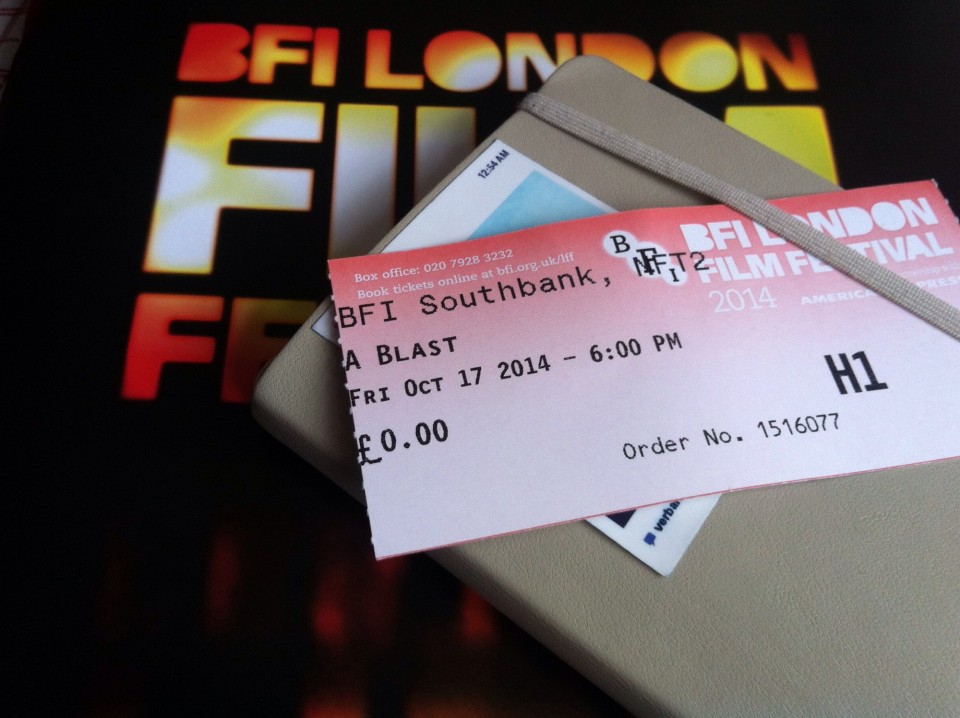
Syllas Tzoumerkas’s second feature film A Blast world-premiered at the Locarno Film Festival. The writer-director tells Cineuropa about the film’s characters and the story’s connection to the situation in the country. Read more →
A BLAST will participate in competition at the 12th TOFIFEST in Toruń, Poland. Maria is running away on the highway. She is alone in her roaring SUV. Behind her, fire and a case full of money. In front of her, the hopeless vastness of the motorway. Only a day before she was a caring mother, a loving wife, a responsible daughter. Today she has gone rogue. As Syllas Tzoumerkas put it: “Set in the fervent years of the collapse of the Greek economy, A Blast tells the story of a generation’s disillusionment and radicalization. Maria starts her adult life with the best of intentions. Ten years after, no matter where she looks her world is cracking. Unwilling to reconcile with a life of unreturned care, lost dignity and broken-down desire to live, Maria attacks. She attacks herself, her past, the people she loves, her country and the perception of her sex in a relentless battle to find truth, in her and around her.”
A Blast’s national premiere at the 20th Athens IFF 2014.




A Blast ist Feuer. Hier herrscht nicht das Schweigen der Unterdrückten, sondern die lautstarke Wut der Hauptfigur Marie, die so nicht leben will: die Steuerschulden der Eltern am Hals, die Alleinverantwortung für ihre drei Kinder auf dem Rücken, während ihr Mann Yannis zur See fährt und nur ab und an für wilden Sex zurückkehrt. Das Studium weiterzuführen ist aussichtslos, Bank und Finanzamt geben sich gnadenlos. Die Familie hat Krise, das Land hat Krise, Maries Schwester und ihr Freund wenden sich wie viele andere dem Hakenkreuz zu. Während in Miss Violence der ordnungsliebende Patriarch ein faschistisches Regiment in den eigenen vier Wänden aufzieht, zeigt A Blast von Syllas Tzoumerkas Fernsehbilder von den Hetzjagden auf Migranten in Athen. Der erste Film schnürt dem Publikum nach und nach die Luft ab, entfaltet das familiäre Elend langsam chronologisch; der zweite ist wie sein Titel – explosiv, impulsiv, in Zeitsprüngen und Rückblenden erzählt. Es wird ein Feuer geben, das steht von Anfang an fest. Und Marie ist nicht der Charakter, der die Tür verschließt, um sich stumm selbst zu verletzen. Ihre Lebenswut ist viel zu groß. Regisseur Tzoumerkas sieht in ihr auch die B-Movie-Heldin, die ohne Rücksicht auf Verluste den Ausbruch wagt. A Blast ist der erste Film im Programm, bei dem ich lustvollen Sex zwischen Erwachsenen sehe. Wo sonst oft Sexualität als Instrument der Erniedrigung und Vernichtung gebraucht wird (Miss Violence), tobt hier zwischen Marie und Yannis tatsächlich Leidenschaft – die allerdings auch schon einen verzweifelten Kern in sich trägt. In einer der verblüffendsten Szenen des Films geht Marie in ein Internetcafé, um sich, mitten in dieser Halböffentlichkeit unter fremden Männern, Pornos anzusehen. Auch das Begehren ist in die Krise geraten; Gefühle sind schleichend verschwunden oder an zuviel Emotion erstickt. In der Familie, in der Gesellschaft kämpft jede der Figuren allein. Read more →
Η καινούργια ταινία του Σύλλα Τζουμέρκα «A Blast» που θα βγει στις αίθουσες τον Νοέμβριο, καταφέρνει να σπάσει την κυριαρχία της φόρμας, συμπυκνώνοντας το ζήτημα της οικογένειας και της πολιτιστικής κρίσης και αρθρώνοντας το αίτημα της ελευθερίας. Read more →
Δυναμίτης: Η Έκρηξη του Σύλλα Τζουμέρκα, που συζητήθηκε αρκετά στο πρόσφατο φεστιβάλ του Λοκάρνο, ίσως να μην ανήκει στο λεγόμενο greek weird cinema. Κυρίως, επειδή εδώ το συναίσθημα είναι διακριτό και ο ρεαλισμός όχι άχρονος, αλλά άμεσα συνδεδεμένος με την Ελλάδα του σήμερα. Γι’ αυτό και η έκρηξη της ταινίας δεν είναι απλώς εσωτερική ή συμβολική. Εξωτερικεύεται εντυπωσιακά με μια ασυνήθιστη Αγγελική Παπούλια, που αποδεικνύει ακόμη μία φορά το μεγάλο της ταλέντο, έτσι όπως αφήνεται απλόχερα στο όραμα του κάθε σκηνοθέτη. Δύο αδελφές που θέλουν γρήγορα να μεγαλώσουν, μία αυστηρή παραπληγική μητέρα, ένας ομφάλιος λώρος που δεν κόβεται ούτε μετά το γάμο των κοριτσιών, η ασφυξία ενός μεγάλου διαμερίσματος καθώς και του οικογενειακού μίνι μάρκετ καταλήγουν σ’ ένα μεγάλο φυτίλι που περιμένει το σπίρτο του. Το ανάβει, τελικά, το κορίτσι που θέλει να μηδενίσει το κοντέρ και να διεκδικήσει τη νέα του ζωή. Read more →
από τον Πάνο Αχτσιόγλου – Κλείνοντας, είπες μετά το τέλος της χθεσινής προβολής ότι υπάρχει μια πολύ περίεργη μορφή πίεσης μέσα στην ελληνική οικογένεια κυρίως με το ότι όταν αναγκαζόμαστε να συγκρουστούμε με ανθρώπους τους οποίους έχουμε δίπλα μας, προκειμένου να αλλάξουμε κάποια πράγματα, όλο αυτό μας δημιουργεί έναν ψυχαναγκασμό. – Δε μου αρέσουν τα θύματα. Αν κάποιος σου κάνει κακό, πρέπει να τον αντιμετωπίσεις. Αν αυτός που σου κάνει κακό είναι η οικογένειά σου πρέπει να αντιμετωπίσεις την οικογένειά σου, αν είναι ο άντρας σου ή ή γυναίκα σου πρέπει να αντιμετωπίσεις τον άντρα σου ή την γυναίκα σου, αν είναι τα παιδιά σου πρέπει να αντιμετωπίσεις τα παιδιά σου, αν είναι ξένοι άνθρωποι, άλλοι πρέπει να αντιμετωπίσεις του άλλους. – Γιατί η ηρωίδα, από ό, τι κατάλαβα στην ουσιαστικότερη σκηνή που έδωσε το έναυσμα για την αρχή της ταινίας, στον μονόλογό της, λέει «θέλω να μιλάω με ξένους»; – Γιατί καμιά φορά αυτό που έχουμε αγαπήσει, είναι αυτό το οποίο μας έχει βουλιάξει στον βάλτο. Το παθαίνουμε αυτό οι άνθρωποι. Read more →